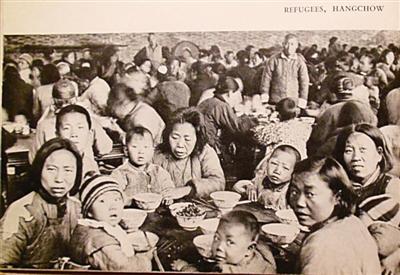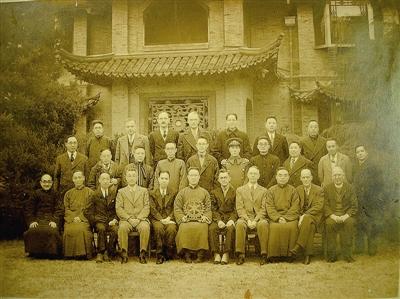'Schindlers' in Chinese city saved 25,000 people in WWII
- By Zhang Lulu
 0 Comment(s)
0 Comment(s) Print
Print E-mail China.org.cn, June 10, 2015
E-mail China.org.cn, June 10, 2015
|
|
| War refugees sheltered at the Guangji Hospital in Hangzhou during World War II. [File photo] |
Expats and local Chinese in the eastern Chinese city of Hangzhou saved 25,000 women and children during the Second World War, according to a descendent of the life-saving 'Schindlers.'
Hangzhou fell into the hands of the Japanese army in December 1937. A large number of citizens were relocated before the Japanese arrived, leaving less than 100,000 people in the city, according to historical documents.
A Red Cross organization, which was comprised of Hangzhou citizens and foreigners who were living in the city, helped shelter the remaining citizens, especially women and children during the devastating war.
Hospitals, churches, and schools built by Britain, the United States and France -- countries which were yet to declare war against Japan -- provided the main shelters for the remaining citizens.
|
|
| Members of the Red Cross. [File photo] |
"Those temporary refugee camps, along with other charity organizations, sheltered 25,000 women and children when the Japanese army occupied Hangzhou," said Tian Jianjun, whose grandfather Tian Haozheng was secretary general of the Guangji Hospital (now the Second Affiliated Hospital of Zhejiang University School of Medicine) and a member of the Red Cross.
"Our first priority was to set up refugee camps so that local citizens could find a sanctuary when the war broke out… I had an opportunity to leave as the Chinese government sent vehicles to help people of neutral countries to retreat, but many of us at the Guangji Hospital decided to stay," Stephen Douglas Sturton, the president of the Guangji Hospital and secretary of the Red Cross, wrote in his autobiography "From Mission Hospital to Concentration Camp."
Some of the Red Cross members recorded the atrocity of the Japanese army and their efforts to help the war refugees, but the documents are rare compared to those in other Chinese cities such as Shanghai and Nanjing.
Tian Jianjun has been searching for the documents for the past 25 years. "I hope more people inside and outside China will pay heed to that historical period and remember the love and glory of humanity shining through the miserable times," Tian said.







